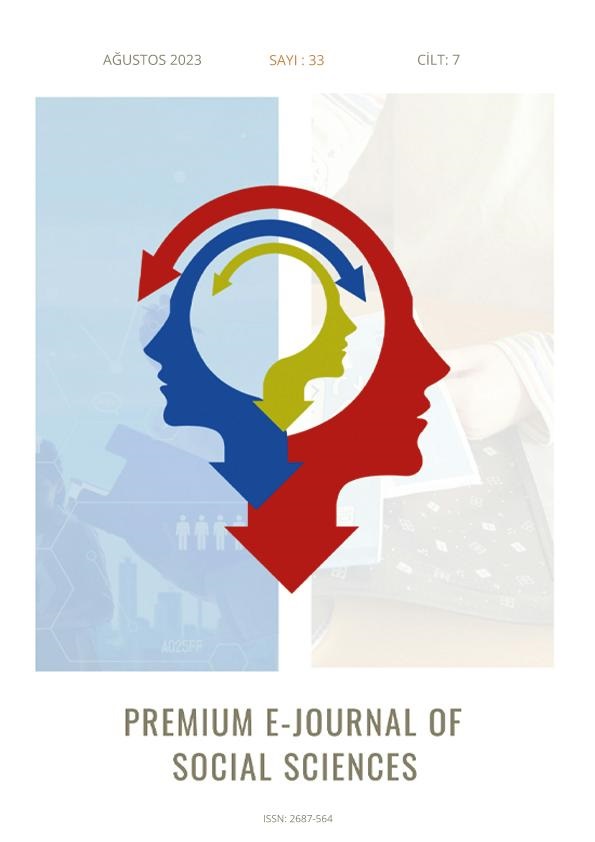The Effect of Talent Management on Organizational Commitment in Primary Schools
DOI:
https://doi.org/10.5281/zenodo.8270717Keywords:
Talent, Talent Management, Talent Management in Education, Organizational CommitmentAbstract
The aim of this study is to examine the effect of talent management on organizational commitment in primary schools. The universe and sample of the research were made on 262 teachers and school administrators selected by simple random method among the teachers and school administrators working in 38 different primary schools in the Esenyurt District of Istanbul, Turkey, in the 2022-2023 academic year. The data were obtained from the personal information form developed by the researchers, two sub-dimensions (Targets and Developing Talent and Performance Evaluation and Retention of Talent) developed by Yerlikaya in 2017, Talent Management Scale in Education consisting of 18 items and three sub-dimensions developed by Han, Dağlı and Elçiçek in 2018 (Emotional Commitment, Continuance Addiction and Normative Commitment) and the Organizational Commitment Scale consisting of 18 items. The research was carried out in a relational screening model with the quantitative method. AMOS 22.0 and SPSS 21.0 statistical programs were used in the analysis of the study data. Confirmatory factor analysis (CFA), item-total correlation and Cronbach Alpha methods were used within the scope of validity and reliability studies of the scales. Then in the analysis of the data; the mean, standard deviation, Anova test, t-test, LSD post hoc test, Pearson correlation test to reveal the relationship between variables, and regression test to determine the effect between variables. As the main finding of the study, it was determined that there is a positive and significant relationship between education talent management and the organizational commitment of teachers working in primary schools. In addition, the results of the research show that demographic characteristics affect the sub-dimensions of talent management and organizational commitment in education at different levels
Downloads
References
Altınöz, M. (2009). Yetenek yönetimi. (1. Baskı). Nobel Yayınları.
Avcı, N. ve Saygılı, Z. (2019). Organizasyonlarda lider tutumunun çalışanların iş bağlılıkları üzerine etkileri: İstanbul ili Gaziosmanpaşa ilçesinde faaliyet gösteren özel temel liselerde bir alan araştırması. Researcher, 7(4), 108-123.
Aydın, G. Ç. ve Koşar, D. (2020). Özel okul yöneticilerinin yetenek yönetimine ilişkin görüşlerinin incelenmesi. Eğitimde Nitel Araştırmalar Dergisi, 8(3), 1000-1028. Doi: 10.14689/issn.2148-2624.1.8c.3s.10m
Büyüköztürk Ş., K. Çakmak E., Akgün Ö.E., Karadeniz Ş. ve Demirel F. (2013), Bilimsel Araştırma Yöntemleri. (15. Baskı). Pagem Akademi Yay.
Büyüköztürk, Ş. (2011). Sosyal Bilimler İçin Veri Analizi El Kitabı. (14. Baskı). Pegem Akademi.
Carver, L., Lori, C. and Gutierrez, A. P. (2011). Survey of generational aspects of nurse faculty organizational commitment. Nurses Outlook. 59, 137-148.
Çokluk, Ö., Şekercioğlu, G. ve Büyüköztürk, Ş. (2010). Sosyal bilimler için çok değişkenli istatistik. Pegem Yayınları.
Davies, B. ve Davies, B. J. (2014). Eğitimde yetenek yönetimi. Tufan Aytaç ve Cemalettin İpek (Çev), Nobel Akademik Yayınları.
Deconick B. J. ve Bachmann P. D. (1994). Organizational commitment and turnover intentions of marketing managers. Journal of Applied Business Research, 10(3), 87-96.
Doğan, S. ve Kılıç, S (2007). Örgütsel bağlılığın sağlanmasında personel güçlendirmenin yeri ve önemi. Erciyes Üniversitesi İktisadi ve İdari Bilimler Fakültesi Dergisi, 29, 37-61.
Erdoğan, M. ve Bebitoğlu, M. E. (2023). İlköğretim çağından başlayarak öğrencilerin yetenek yönetiminin sürdürülebilir hale getirilmesinde öğretmen ve velilerin rolüne ilişkin bir inceleme. International Journal of Sustainability, 1(1), 5-26.
Esmer, Y. ve Yüksel M. (2017). İş yaşamında örgütsel bağlılık: teorik bir çerçeve. Akademik Bakış Dergisi, 62, 258-272.
Gündoğmuş, E., Çolak, F. ve Vardarlıer, P. (2021). İşletmelerde yetenek yönetimi uygulamaları. Sakarya Üniversitesi İşletme Enstitüsü Dergisi, 3(1), 161-166. Doi: 10.47542/sauied.848916
Han, B., Dağlı, A. ve Elçiçek, Z. (2018). Örgütsel bağlılık ölçeğinin Türkiye uyarlanması: geçerlilik ve güvenilirlik çalışması. Elektronik Sosyal Bilimler Dergisi, 17(68), 1788-1800. Doi: 10.17755/esosder.445932
Ofluoğlu, G., ve Bayraktar, A. S. (2021). Yetenek Yönetiminin çalışanların kariyer memnuniyetine etkisi. International Journal of Management and Administration, 5(10), 37-52.
Saygılı, S. (2013). Sanayi Toplumundan Bilgi Toplumuna Geçiş Sürecinde Eğitimde Dönüştürücü Bir Entelektüel Olarak Öğretmenler. Uşak Üniversitesi Sosyal Bilimler Dergisi, 6(Özel Sayı), 270-281.
Sığrı, Ü. (2007). İş görenlerin örgütsel bağlılıklarının Meyer ve Allen tipolojisiyle analizi: kamu ve özel sektörde karşılaştırmalı bir araştırma. Anadolu Üniversitesi Sosyal Bilimler Dergisi, 7(2),261-278.
Tabancalı, E. ve Korumaz, M. (2014) Eğitim örgütlerinde yetenek yönetimi. The Journal of Academic Social Science Studies, 25(1), 139-156. Doi number: http://dx.doi.org/10.9761/JASSS2336
Tanrıverdi, H., Koçarslan, G. ve Perdeci, O. (2017). Örgütsel adalet, örgütsel bağlılık ve motivasyon arasındaki ilişki. Ulakbilge. 5(11), 533-555. DOI: 10.7816/ulakbilge-05-11-02
Yerlikaya, S. (2017). Okul yöneticilerinin yetenek yönetimi ile öğretmenler arasındaki farklılıkları yönetme yeterlikleri. [Yayınlanmamış Doktora Tezi]. Eğitim Bilimleri Enstitüsü, Abant İzzet Baysal Üniversitesi.
Downloads
Published
How to Cite
Issue
Section
License
Copyright (c) 2023 Premium e-Journal of Social Science (PEJOSS)

This work is licensed under a Creative Commons Attribution 4.0 International License.


